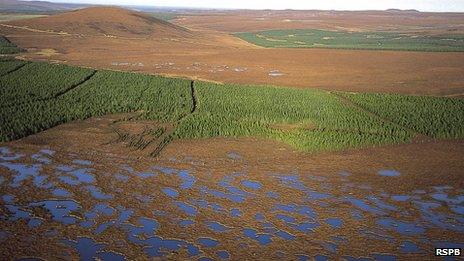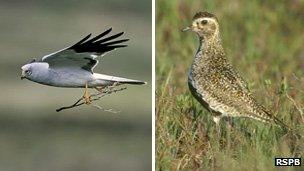Lottery boost for Flow Country peatland restoration
- Published

Huge areas of blanket bog were damaged or eroded by forestry planting during the 1970s and 1980s
Seven square miles of peatlands may be restored in the Highlands after the project passed the first stage of its application for Lottery funding.
If approved, it will provide £4m for the work.
Restoring part of Europe's largest intact expanse of blanket bog will take five years.
The Flow Country in Caithness is one of the last great wildernesses in the UK and has been put forward as a potential Unesco World Heritage Site.
Initial approval will provide the project with £147,000 development funding.
It is hoped the work will improve the habitats for rare plants and species.
The Flow Country's peatlands stemmed from damp and cool conditions that encouraged the growth of sphagnum moss and cotton grasses since the last Ice Age, more than 10,000 years ago.
The partially-decayed plants slowly formed layers of peat many metres deep, with vast amounts of carbon locked in.
An estimated 400 million tonnes of carbon is stored in the peat in the Flow Country which is double the amount of carbon in all the UK's forests.

It is hoped the work will improve habitats for birds like hen harriers and golden plovers
After remaining largely untouched for millennia, the area underwent huge change in the 1970s and 80s when non-native conifer trees were planted in an effort to make the land more productive.
As a result, huge areas of blanket bog were damaged or eroded.
Bog plants were lost, rare bird species seriously declined, and carbon was now being emitted instead of being absorbed and stored.
An inquiry into UK peatlands by the International Union for Conservation of Nature found that a loss of only 5% of the carbon stored in peat would equate to the UK's total annual greenhouse gas emissions.
The restoration will include a new field centre, which will be located at the RSPB's Forsinard Flows nature reserve.
The reserve, the RSPB's largest, has been at the centre of peatland restoration work for 16 years.
It is hoped the work will improve the habitats for many rare plants and species, including otters, hen harriers and golden plovers.
'Climate change agenda'
Colin McLean, head of the Heritage Lottery Fund in Scotland, said: "The Flow Country is an area of exceptional natural heritage merit. Over 8,000 years of the history of plants, weather and people lie preserved in its layers of peat.
"We are delighted to be able to give our initial support to a project which will reverse the damage of earlier forestry planting, while we still can, and make an important contribution to the global climate change agenda."
John Henderson, chairman of the Peatlands Partnership, which is co-ordinating the work, said: "We're delighted that we have cleared this all important first hurdle and that the Heritage Lottery Fund recognises the potential of what can be achieved in this landscape.
"The Flow Country is a truly special area, a valuable store for carbon, a haven for birds and animals and remarkably beautiful.
"Its future protection and conservation is essential if we want to reduce the devastating impacts of climate change."
The Peatlands Partnership comprises RSPB Scotland, Scottish Natural Heritage, Forestry Commission Scotland, Highland Council as well as individuals and stakeholders from the local community.
- Published16 November 2011
- Published28 May 2010